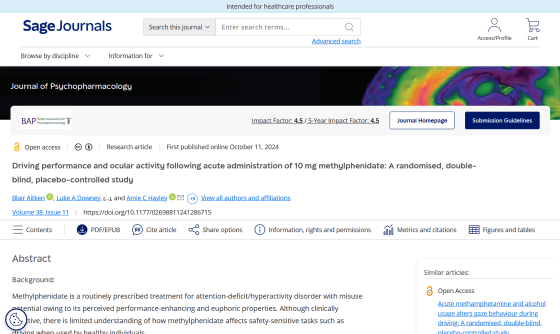Study finds that ADHD drug Concerta may improve driving ability

In recent years,
Driving performance and ocular activity following acute administration of 10 mg methylphenidate: A randomized, double-blind, placebo-controlled study - Blair Aitken, Luke A Downey, Serah Rose, Thomas R Arkell, Brook Shiferaw, Amie C Hayley, 2024
https://journals.sagepub.com/doi/10.1177/02698811241286715

Common ADHD Drug Could Make Some People Better Drivers : ScienceAlert
https://www.sciencealert.com/common-adhd-drug-could-make-some-people-better-drivers
It is known that adults with ADHD are at higher risk of traffic accidents , traffic violations , and dangerous driving such as sudden braking. Research has shown that when people with ADHD take methylphenidate, the main ingredient in Concerta, their driving ability significantly improves.
However, in recent years, more and more people without ADHD are taking methylphenidate as a smart drug, and in the United States alone, 5 million adults are taking high doses of methylphenidate for long periods of time. Given this situation, it is important to know how methylphenidate affects driving ability in people without ADHD.
The research team recruited 25 mentally and physically healthy drivers who had not been diagnosed with ADHD and investigated how taking methylphenidate affected their driving ability.

The subjects were given either 10 mg of methylphenidate or
In the experiment, subjects were asked to drive in the leftmost lane (first lane) for 40 minutes while maintaining a driving speed of 100 km / h, and occasionally had to overtake the car in front. While the subjects were driving, a machine carefully monitored their eye movements, and a camera attached to the dashboard measured the time of eye fixation and the speed of movement, and the driving simulator's software recorded 'how far the driver deviated from the center of the lane.'
The results of the experiment showed that subjects who took methylphenidate showed less deviation in driving position and speed, especially in the latter half of the drive, and their driving ability improved significantly. However, there was no significant difference in eye movements.
The graphs below show, from the left, 'deviation from the center of the lane,' 'deviation from the designated driving speed,' and 'changes in steering operation.' The horizontal axis shows the time from the start of the experiment, and the vertical axis shows the magnitude of deviation or change. Comparing the placebo group (green line) with the methylphenidate group (blue line), it is clear that the methylphenidate group performed better in the categories of 'deviation from the center of the lane' and 'deviation from the designated driving speed.'

'This study only examined low doses of methylphenidate, and it is possible that higher doses and longer durations of use may have different effects. Further research is needed to identify the salient changes in eye movements induced by methylphenidate and other psychostimulants in particular,' the researchers concluded.
Related Posts:







